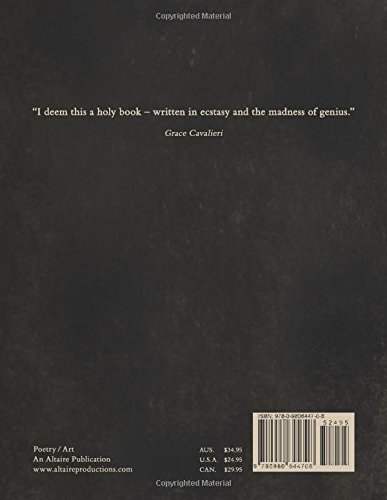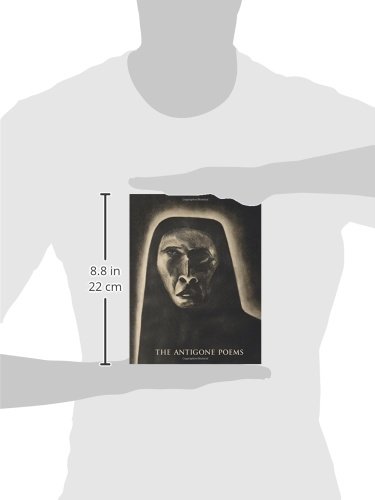Some deliveries may take a little longer than usual due to regional shipping conditions.
Customer Services
Copyright © 2025 Desertcart Holdings Limited




Full description not available
K**E
A short and sweet collection of lovely poems
I disagree with some of the reviews that I have read that Marie Slaight creates a modern retelling of the aforementioned play. I do not believe that these poems will be understood as someone telling the classic with a modern twist, which is a little misleading depending on how you read some of the descriptions and reviews of this book. However, this is still an excellent book, you will be brought into the symbolism and imagery of Antigone's heroic yet terrible narrative. These poems were written in the 1970's, attached with charcoal sketches of the same time period when the author and illustrator were in Montreal and Toronto.However, don't think that you wouldn't enjoy the book just because you know nothing of Antigone. These poems are beautiful and brilliant as stand alone poems. I was surprised how fast I ate up these poems, and they were very quick to read. I believe I finished this book for my second time around just on the bus back to my apartment. You will be amazed at the morbid yet impeccably intricate details, subtle rhyme, and alliteration that is littered through every poem in this small collection.The charcoals are GORGEOUS. They are definitely a huge plus for the book, you get a couple littered in between the poems and a lot of beautiful charcoal sketches at the end of the book. I can admit that it might be a reason for the high price.In the end, this book is definitely something to pick up and read. I recommend you shop around for a good price, or just go ahead and buy it nice and new! I saw some pictures of the physical cover and I admit it is beau-ti-ful!
B**S
Shifting like a dark-colored kaleidoscope
I had read a few poems by Marie Slaight before I found this on Early Reviewers, but the main draw was the idea of a cycle of poems derived from the Antigone story. I hadn't expected—and at first was a little put off by—the visceral, nonnarrative approach. (This is not the book to read if you want a recap.) But, in short order, I was seduced by what seems almost a private introduction into the (justifiably) troubled mind of the passionate, unsparing (and unspared) title character. This Antigone is all sharp edges and raw anger. She won't woo you with noble bearing or elegant phrases—she simply hasn't got time. Just as the Greek woman must have wanted to, this Antigone rails as she is swallowed whole by circumstances and events about which she is permitted no say, even though they control her fate. I've been very careful not to give away the "ending." Do yourself a favor: the first time you read it, do so in one gulp, reading it straight through; permit yourself to wallow with Antigone. With any luck, you will be startled by what you find, and with that informing rereadings, the book will shift like a dark-colored kaleidoscope.
S**S
Not just a meal, a five-course meal
Review by Jessica BellWhat an honour to have been given a review copy of The Antigone Poems. I gobbled this book up. Then gobbled it up again. Then savoured each word during my third read through. Notice a couple of eating-related words there? This is no mistake. This book isn’t just a meal, it’s a five-course meal.The Antigone Poems is so stark and striking in design. Minimal text decorates the large cream cartridge pages, giving you the impression that you’re about to dine on a variety of French dishes. And once you begin reading, each poem overwhelms your senses with potent flavours and subtle seasonings. With every word you push through your lips (this book must be read aloud), comes a new and intensified spice of irresistible pain and angst.Though this book is an “intensely personal invocation of the ancient Greek tragedy,” Antigone, by the ancient Greek tragedian, Sophocles, you do not need to have read Sophocles’ timeless tale to “get” it. I could, probably, with a little more time on my hands, write a review that references individual moments in the original play, but I won’t. Not because it wouldn’t be an interesting exercise, but because I think this book needs to be read and enjoyed without potential readers feeling burdened by the subject matter.I’ll say it again: You do not need to have read Antigone to enjoy this book.This book is about life and death, pain and love. If you have a dark passionate side to your soul like me, you will surely find yourself salivating over breathtaking lines such as:If this perfume doesn’t burstIt will twist into venom.andAll love painsAre an aged protestWanting fresh surge;Decrying the ancient throbOf memories.Not only are these lines breathtaking, but they also embody so much perpetual truth, much like the words in Sophocles’ tragedies do. But again, you do not need to know that, to feel that.Let me move on from the words now, because the way the words are presented have so much meaning and depth, too.In Chapter One (there are five chapters), concise, yet rich, fragments of text garnish each page, which gradually grow in length, until the last page of the chapter where we are struck with a full page of prose. I can’t help but think this was done purposefully to symbolize the way in which pain cultivates inside us and then explodes into a chaos you can no longer contain.At the end of each chapter is a charcoal drawing. Very stark and powerful images of faces. As the book progresses, a little more detail is added to the images, as though the emotion pulsing through the poems is also being reflected through the faces. I won’t go into any more detail here, as I don’t want to ruin the experience of reading/viewing it for yourself.All in all, an amazing book. I highly recommend it to all lovers of poetry and fans of Greek tragedy. Excuse me while I relax under the Greek sun, to read through this remarkable book for a fourth time.Note: If you seem to be living in Greece while reading this book (like me), it’s an added bonus.
C**A
The artifact itself is beautiful, gorgeously printed on lovely paper
*ARC provided for honest review*The Antigone Poems trace a delicate anatomy of desire and loss. The images and text complement each other and drive towards an understanding of the divine. Intended as a retelling of Sophocles’ tragedy, this collection has a delicate subtlety that may, in fact be too subtle. While it is clear from the title that these are designed as a retelling, there are no clear parallels to draw between the work of Sophocles and this collaboration.The artifact itself is beautiful, gorgeously printed on lovely paper. That said, every single page is blank on the back, with no clear indication of why, and without enforcing or engaging with the text, art, or overall poetics.There is also a single moment in the text that completely pulled me out of the narrative. Feeling at best like authorial intrusion, and at worst like a confessional, this moment is an entire page of narrative prose in a text otherwise full of minimal free verse dripping with a clean lyricism. It was this, more than anything else that brought this book from 4 stars down to 3.
Trustpilot
1 month ago
5 days ago